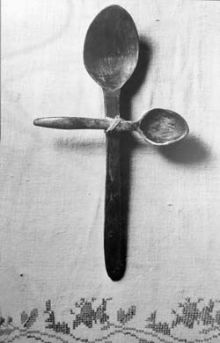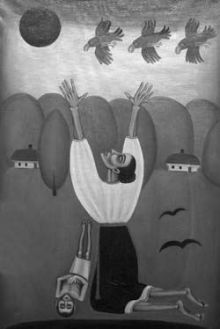The last Saturday in November is the day we remember our Doomsday. No nation, no normal person on this earth can look back on the catastrophe of the Holodomor without feeling unspeakable horror and utter sorrow for the eight million innocent human souls that were murdered in such an atrocious way. These feelings are all the more intense for Ukrainians. In 1932-1933 our nation lost every fifth, or quite possibly every fourth, brother and every fifth sister — the nation’s pride and joy. Most horribly, it lost eight million talented, or perhaps even brilliant, farmers as well as unique intellectuals: teachers, humanities scholars, priests, and many others. The merciless “Kremlin highlander,” like a killer robot planned and calculated his blow with a sniper’s precision by targeting the nation’s elite. It was not during a time of war, drought, or bad harvest that he deliberately chose to exterminate eight or perhaps even ten million Ukrainians. To deny that this crime had all the attributes of genocide is no longer merely malicious demagoguery. It represents a degree of blasphemy that people in the olden days would condemn as the lack of Godly fear.
The Ukrainian president’s order establishing the Day to Commemorate the Victims of the Holodomor would have been impossible without catharsis, the cleansing of national consciousness, a boundlessly painful but inevitable process. In plain terms, the Ukrainian nation had to peer into the abyss to learn the horrible truth about the carefully planned and mercilessly “centralized” genocide. One individual — not a Ukrainian by birth but still a truly great Ukrainian Patriot — worked harder than anybody else for this truth to be heard both in Ukraine and throughout the world. This man was the late James Mace. The historic achievement of this outstanding scholar and citizen was not only in being the first to introduce into scholarly discourse a tremendous amount of painstakingly documented facts relating to the Holodomor. More importantly, James took our infernal pain into his sensitive heart, feeling that it was entirely up to him to carry out this inhumanly difficult, Herculean task (“I was chosen by your dead” — I believe that our descendants will never forget these words of James Mace). We at The Day clearly understand that nobody can “privatize” the name and heritage of James Mace, because they now belong to Ukraine. But we will never forget that it was our newspaper that carried Jim’s now world-famous articles that exposed the diabolical mechanism of the “terror by famine” that the Kremlin’s leadership set into motion in the early 1930s. The publication of the book, Day and Eternity of James Mace, represents the fulfillment of our sacred duty, our humble tribute to the memory of this unforgettable man.
It has been a year and a half since Jim’s death. Now that he has left us, we must continue the search for the truth and vital answers to the “accursed questions.” Why are these answers vital? Because they enable us to gain a clear understanding of one exceptionally important truth: until we complete democratic transformations in society (the criterion of such transformations being not the frequency with which we mention the Orange Revolution in vain, but the real independence of people from the state — not the other way around!), we will remain in the same system of coordinates that advocated unbridled class violence, inevitably creating the “image of an enemy” and eventually paving the way for the Holodomor.
The world knows too little about this Ukrainian catastrophe, even after everything James Mace accomplished. Prosperous countries have an exceptionally high “pain tolerance” level. They find it extremely hard to imagine the horror of what happened in Ukraine and are not always willing to overcome the resistance of certain Moscow-pleasing political forces. Thus, Ukrainian diplomats face the most important task of securing official recognition by the international community and the UN of the Holodomor as an act of genocide against the Ukrainian nation. Experts say that the realistic date for this is 2007.
I would like to point out something else. The eight million who starved to death were not the only victims of the genocide. So were those who survived it. All of them, and their children and grandchildren suffered profound, lifelong, and irreparable trauma that deformed their mentality and left an eternal wound on their consciousness. They have to live with this forever because there is no escaping the horrors of memory. I repeat: Stalin and his henchmen were perfectly aware of what they were doing. As he admitted in his Aug. 11, 1932, letter to Kaganovich, he wanted “to turn Ukraine as soon as possible into a veritable fortress of the USSR, an exemplary republic. No money should be spared to this end.” (Read: Once and for all destroy in the Ukrainian nation, primarily among the millions of its peasants and intellectuals, the sense of national dignity and ownership of their land, thereby making them unable to rise up against tyranny. Millions of lives are not to be spared).
And so they did.
There are some words that should be treated with the utmost care: revolution, freedom, God. A devaluation of these sacred words is very dangerous to the spiritual health of society. However, on this day of mourning and remembrance I cannot help mentioning the lofty and eternal ideal of Freedom. After all, the horrors of the Holodomor offer irrefutable proof that a society without freedom is defenseless against lies and deceit and their inevitable result — violence, which ranges from violence in carefully “measured” doses, to “targeted” violence that affects “only” individual victims, to genocide; or against the will of a despot filled with hostility toward a nation. Thus, the struggle for freedom is a colossal question not only of progress but of life and death, as evidenced by the history of the 20th century and primarily the apocalypse of terror by famine. The loss of Ukrainian statehood after the unsuccessful national-liberation struggle of 1918-1922 was the historical catastrophe that laid the groundwork for another catastrophe on a Biblical scale — the Holodomor. This is the price our society paid for Independence, which some cynics now call into question: “Independence from whom?”
The Holodomor would have been impossible if it hadn’t been for a horrible and hideous phenomenon that saw the deliberate creation and expansion to bacchanalian proportions, and the cruel exploitation of the “image of an enemy,” and the orgy of informants that it touched off. Anybody could be turned into an enemy (because “criteria” were established and absolutely arbitrarily modified by the Stalinist government). Anybody could be denounced as a “sub-kulak,” “saboteur,” or “counterrevolutionary” with all the attendant consequences. As for the intelligentsia, it was constantly under the Damocles’ sword of accusations of “bourgeois nationalism.” It will be recalled that even the Ukrainian orthography of the time was denounced as “nationalist” and “counterrevolutionary.” Terror by famine and genocide were crimes against humanity, which were carefully planned and organized by the Kremlin. This is an undeniable and irrefutable fact. The horrible truth is that often the immediate perpetrators were members of the same community, who expropriated wealthy kurkul peasants, conducted searches, seizing food stocks down to the last grain and thus condemning people to a martyr’s death by starvation. Were these Martians? This is why the memory of the Holodomor is unthinkable without Repentance, something that has unfortunately been forgotten in recent years.
On Nov. 26 millions of Ukrainians lit candles in remembrance of our national catastrophe. This is much more important than the official ritual of hanging state flags with black mourning ribbons or observing a minute of silence as envisioned by the Ukrainian president’s order (a debatable point). The light from a candle is not an official thing, but it means something intimate and deeply personal to every individual. I think James Mace, who originally proposed placing lit candles in our windows, would agree.









